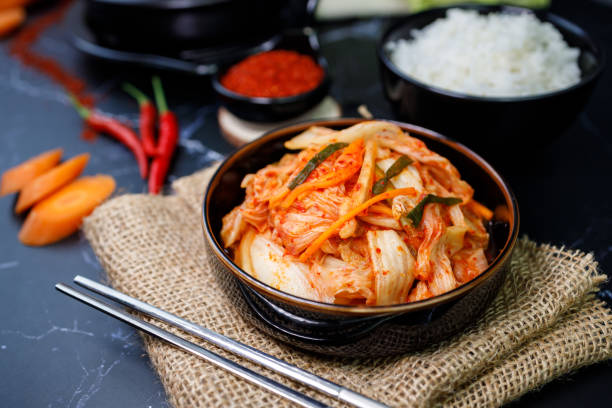Kimchi, a traditional Korean fermented vegetable dish, is celebrated not only for its unique, tangy flavor but also for its impressive nutritional profile. Made primarily from napa cabbage and radishes, along with a variety of seasonings like chili pepper, garlic, ginger, and fish sauce, kimchi is a staple in Korean cuisine and is gaining popularity worldwide due to its health benefits. This essay explores the nutritional value of kimchi and the various health benefits it offers.

Kimchi is a rich source of essential vitamins and minerals. The primary ingredients, such as napa cabbage and radishes, are packed with vitamins A, B, and C. Vitamin A is crucial for maintaining healthy vision, skin, and immune function. Vitamin B complex, including B6 and B12 found in kimchi, supports energy metabolism and brain health. Vitamin C acts as a potent antioxidant, enhancing the immune system and protecting against cellular damage. Additionally, kimchi provides significant amounts of calcium, potassium, and magnesium. Calcium is essential for bone health, potassium helps regulate fluid balance and muscle contractions, and magnesium plays a role in over 300 enzymatic reactions in the body.

Kimchi is high in dietary fiber, which is crucial for maintaining healthy digestion, promoting regular bowel movements, and preventing constipation. Fiber also helps regulate blood sugar levels, lower cholesterol, and support weight management by promoting feelings of fullness.
One of the most significant health benefits of kimchi comes from its fermentation process, which produces probiotics. Probiotics are beneficial bacteria that support gut health by maintaining a healthy balance of gut flora. A healthy gut microbiome is associated with improved digestion, enhanced immune function, and reduced risk of chronic diseases such as obesity, type 2 diabetes, and inflammatory bowel disease. The fermentation process also helps break down nutrients, making them easier for the body to absorb.

The ingredients in kimchi, particularly garlic, ginger, and chili peppers, contain bioactive compounds with anti-inflammatory and antioxidant properties. Garlic and ginger are known for their ability to reduce inflammation and oxidative stress in the body. Capsaicin, the active compound in chili peppers, has metabolism-boosting properties and can help reduce pain and inflammation. These properties contribute to reducing the risk of chronic diseases and promoting overall health.

Kimchi is low in calories but high in nutrients, making it an excellent addition to a weight management plan. The fiber content helps promote satiety, reducing overall calorie intake. Additionally, some studies suggest that the probiotics in kimchi can influence weight loss by affecting the metabolism and storage of fat. Including kimchi in a balanced diet can support weight management goals while providing essential nutrients.#### Immune System Support.
The vitamins and minerals found in kimchi, particularly vitamins A and C, play a crucial role in supporting the immune system. Vitamin A helps maintain the integrity of mucous membranes in the respiratory and digestive tracts, which act as barriers against infections. Vitamin C stimulates the production and function of white blood cells, enhancing the body’s ability to fight off pathogens. The probiotics in kimchi also support immune function by promoting a healthy gut microbiome, which is closely linked to the immune system.

While kimchi offers numerous health benefits, there are a few considerations to keep in mind. Traditional kimchi recipes can be high in sodium due to the use of salt in the fermentation process. High sodium intake is associated with increased blood pressure and a higher risk of heart disease. To mitigate this, it’s advisable to consume kimchi in moderation and choose varieties with reduced sodium when available. Additionally, individuals with certain health conditions, such as those with a sensitive stomach or gastrointestinal disorders, may need to consume kimchi cautiously, as the spicy and fermented nature of the dish can sometimes cause discomfort.

Kimchi is a nutrient-dense food that offers a variety of health benefits, from improving gut health and providing essential vitamins and minerals to offering anti-inflammatory and antioxidant properties. Its high fiber content supports digestive health, while the probiotics produced during fermentation enhance the gut microbiome. By incorporating kimchi into a balanced diet, individuals can enjoy its unique flavor and numerous nutritional advantages, contributing to overall well-being. As with any food, moderation is key, and considering the sodium content can help maximize the health benefits of this traditional Korean dish.





Great breakdown! For e-sports bettors, having the right tools can make all the difference. Check out AI powered solutions to streamline your strategy and stay ahead of the game.
Interesting points about bankroll management! Seeing platforms like bigbunny casino offer quick deposits via GCash & PayMaya definitely streamlines things for PH players. Key for consistent play!